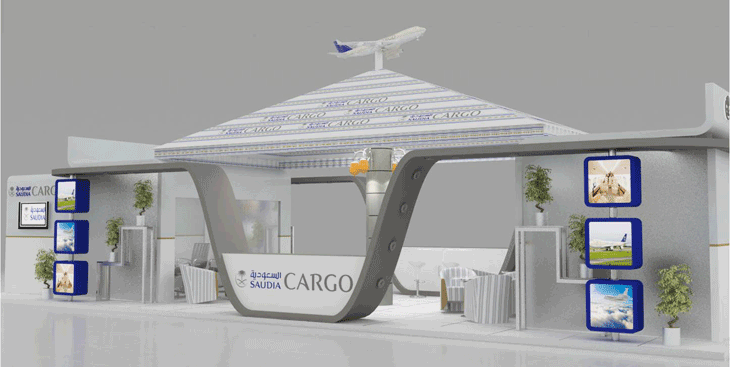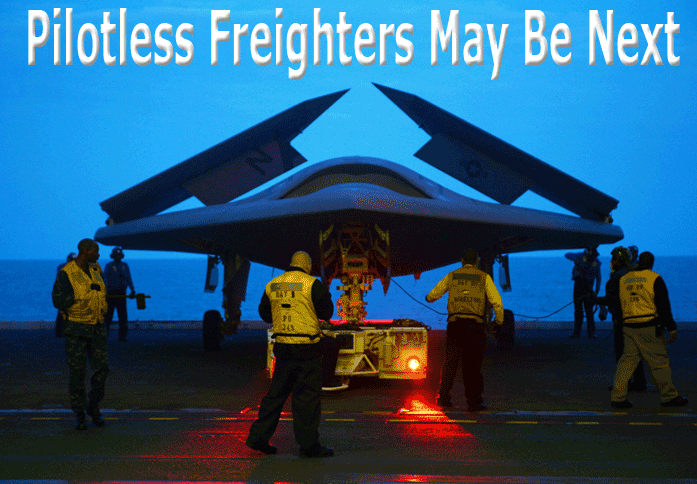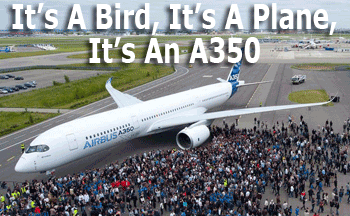
 he Russian air cargo industry
is on the verge of big change
due to state plans to adopt
a package of measures aimed
at increasing Russia’s
share in global air cargo traffic.
he Russian air cargo industry
is on the verge of big change
due to state plans to adopt
a package of measures aimed
at increasing Russia’s
share in global air cargo traffic.
According to estimates of the
Russian Ministry of Transportation,
currently the country’s
share in global air cargo traffic
is estimated at only 2.5 percent,
despite the fact that the country's
air space has some unique competitive
advantages as it is located
on the world’s most intensive
cargo routes.
 However,
so far, the country has not
been in the sphere of interests
of the world’s leading
cargo airlines, due to underdevelopment
of the national air freight
industry and the existence of
numerous problems, among which
are non-competitive prices for
air cargo services, lack of
freight aircraft of all classes,
low level of development of
ground infrastructure as well
as ATM system, the underdevelopment
of the segment of logistics
operators, cumbersome process
of cargo clearance at the border,
and the lack of an e-freight
standard.
However,
so far, the country has not
been in the sphere of interests
of the world’s leading
cargo airlines, due to underdevelopment
of the national air freight
industry and the existence of
numerous problems, among which
are non-competitive prices for
air cargo services, lack of
freight aircraft of all classes,
low level of development of
ground infrastructure as well
as ATM system, the underdevelopment
of the segment of logistics
operators, cumbersome process
of cargo clearance at the border,
and the lack of an e-freight
standard.
Valery
Okulov, Russia’s Deputy
Minister of Transport, comments:
"Today,
the image of Russian air cargo
transportation services in the
global market remains bad due
to several factors, among which
are the cost of services and
their quality, as well as the
level of bureaucracy, complicated
by various administrative barriers."
According
to data from the International
Air Transport Association (IATA),
23,279 cargo flights on the
Europe-Asia route in 2011 were
flown on international transit
routes in Russian airspace,
of which only 2,481 flights
refuelled by landing at Russian
airports.
At
the same time, according to
Okulov, Russia has a number
of advantages that may be of
interest to the world’s
air cargo carriers.
One
major positive is the country’s
unique geographic position,
the access to routes close to
the great circle route, resulting
in critical operating efficiencies
and even major cost reduction.
However,
according to Okulov, good geographical
position alone is not enough,
and there is a need to design
a package of measures to help
attract international air cargo
carrirs in to domestic Russian
airspace.
Among
such measures would be the establishment
of cargo hubs at some leading
domestic airports, facilitating
the issuance process of visas
to members of foreign aircraft
crews flying through Russian
airspace, the provision of tax
benefits, and, in particular,
VAT zeroing, as well as a number
of other measures.
In
addition, the government plans
to create favorable conditions
for domestic and foreign airlines
to promote refuelling landings
at Russian airports.
All
of these measures are expected
to take place as part of the
pre-existing regulations in
the field of air cargo traffic,
such as the “Federal Program
Development of transport system
of Russia 2010-2015, as well
as subprogram of the Development
of export of transport services
in Russia."
Russian
analysts in the field of air
cargo have welcomed these new
state initiatives.
 Rano
Dzhuraeva, President of the
Innovation Center of Civil Aviation,
one of the largest Russian analytical
agencies in the field of air
transportation, comments:"Due
to the fact that the rate of
growth in the domestic air cargo
market is rising very slowly,
there is a need to create conditions
to attract global cargo air
traffic in the country’s
airspace.” Rano
Dzhuraeva, President of the
Innovation Center of Civil Aviation,
one of the largest Russian analytical
agencies in the field of air
transportation, comments:"Due
to the fact that the rate of
growth in the domestic air cargo
market is rising very slowly,
there is a need to create conditions
to attract global cargo air
traffic in the country’s
airspace.”
According
to her, much can be learned
from the experience gained in
establishing air cargo hubs
such as Dubai, Anchorage, Singapore,
Alma-Ata, that have already
been operational for a period
of 3-5 years.
According
to plans from the Russian Ministry
of Transport, such hubs can
be established at existing Russian
airports, such as Novosibirsk
Tolmachevo Airport, the airport
for Russia's third largest city,
and some others.
The
Tolmachevo Airport is situated
strategically in the middle
of a route that connects important
East-Asian cities (e.g. Seoul,
Shanghai, Hong Kong, etc.) to
Europe, which makes it attractive
for cargo airlines to use for
refueling stops.
Ministry
analysts believe that the Tolmachevo
Airport could become one of
Russia’s leading air cargo
hubs in the near future, especially
taking into account that the
number of its air cargo flights
for the last several years has
significantly increased from
182 in 2007, up to more than
2,000 in 2012.
In
addition to Tolmachevo, another
such hub may be established
at Moscow Sheremetyevo airport,
which had cargo traffic in excess
of 350,000 tonnes.
At
the same time the Ministry analysts
also believe that future development
of the national industry of
air cargo traffic will depend
on the activities of leading
local players; some of whom
are already prepared for the
competition with leading global
players.
Representatives
of AirBridgeCargo, Russia's
leading cargo airline, welcome
the potential arrival of global
carriers to the Russian market,
believing that this will stimulate
competition. AirBridgeCargo
is ready for it; they are in
position with good results generated
in 2012, when cargo traffic
exceeded 400,000 tons.
The
same opinion is shared by Aeroflot,
Russia’s second largest
air cargo carrier, with annual
cargo traffic of 170,000 tons
in 2012.
According
to experts of the Center of
Civil Aviation, successful implementation
of these measures will allow
Russia to receive annual revenues
of up to $3.5 billion from freight
services on Europe-Asia routes,
with the annual number of transit
flights at more than 70,000.
Eugene
Gerden/Sabiha Arend
|




 ir
Cargo Germany filed for bankruptcy
on May 3.
ir
Cargo Germany filed for bankruptcy
on May 3. Exquisite
. . . As Saudi Arabian Cargo
becomes simply Saudia Cargo,
here comes a brand new dominator
trade show stand that will debut
in Germany next month at Air
Cargo Europe June 4-7, in Munich.
Exquisite
. . . As Saudi Arabian Cargo
becomes simply Saudia Cargo,
here comes a brand new dominator
trade show stand that will debut
in Germany next month at Air
Cargo Europe June 4-7, in Munich.
 he Russian air cargo industry
is on the verge of big change
due to state plans to adopt
a package of measures aimed
at increasing Russia’s
share in global air cargo traffic.
he Russian air cargo industry
is on the verge of big change
due to state plans to adopt
a package of measures aimed
at increasing Russia’s
share in global air cargo traffic. However,
so far, the country has not
been in the sphere of interests
of the world’s leading
cargo airlines, due to underdevelopment
of the national air freight
industry and the existence of
numerous problems, among which
are non-competitive prices for
air cargo services, lack of
freight aircraft of all classes,
low level of development of
ground infrastructure as well
as ATM system, the underdevelopment
of the segment of logistics
operators, cumbersome process
of cargo clearance at the border,
and the lack of an e-freight
standard.
However,
so far, the country has not
been in the sphere of interests
of the world’s leading
cargo airlines, due to underdevelopment
of the national air freight
industry and the existence of
numerous problems, among which
are non-competitive prices for
air cargo services, lack of
freight aircraft of all classes,
low level of development of
ground infrastructure as well
as ATM system, the underdevelopment
of the segment of logistics
operators, cumbersome process
of cargo clearance at the border,
and the lack of an e-freight
standard.  Rano
Dzhuraeva, President of the
Innovation Center of Civil Aviation,
one of the largest Russian analytical
agencies in the field of air
transportation, comments:"Due
to the fact that the rate of
growth in the domestic air cargo
market is rising very slowly,
there is a need to create conditions
to attract global cargo air
traffic in the country’s
airspace.”
Rano
Dzhuraeva, President of the
Innovation Center of Civil Aviation,
one of the largest Russian analytical
agencies in the field of air
transportation, comments:"Due
to the fact that the rate of
growth in the domestic air cargo
market is rising very slowly,
there is a need to create conditions
to attract global cargo air
traffic in the country’s
airspace.” 


 t
might not seem like a big deal
for a business partnership to
last for two decades, but in
an ever changing world, with
alliances made and broken as
quickly and easily as the changing
seasons, an enduring partnership
is truly something to shout
about.
t
might not seem like a big deal
for a business partnership to
last for two decades, but in
an ever changing world, with
alliances made and broken as
quickly and easily as the changing
seasons, an enduring partnership
is truly something to shout
about.





